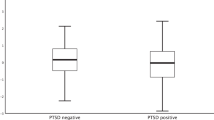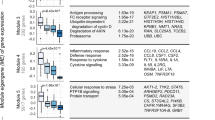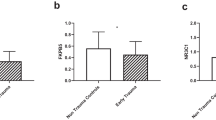Abstract
Post-traumatic stress disorder (PTSD) is associated with a dysregulation of the hypothalamus–pituitary–adrenal axis (HPA axis). In addition, there is evidence for altered glucocorticoid receptor (GR) expression and function in peripheral blood mononuclear cells. The aim of the present study was to differentiate between the effect of trauma exposure and PTSD on leukocyte GR expression and glucocorticoid immune regulation. Leukocyte GR binding characteristics and glucocorticoid sensitivity of immune activity, determined as the effect of dexamethasone (DEX) on in vitro cytokine release and T-cell proliferation, were compared between veterans with PTSD, traumatized veterans without PTSD and healthy controls. Leukocyte GR density was significantly lower in veterans with and without PTSD compared to healthy controls. DEX-induced inhibition of T-cell proliferation was significantly lower in PTSD compared to trauma and healthy controls. DEX-induced increase in lipopolysaccharide-stimulated interleukin-10 was less pronounced in traumatized veterans with and without PTSD compared to healthy controls. No group differences were observed in the effect of DEX on other cytokines or in baseline immune activity, except for lower tumor necrosis factor-α production in PTSD patients compared to healthy controls. The results suggest that trauma exposure is sufficient to induce changes in GR binding characteristics, whereas resistance of T-cell proliferation to DEX only occurs in PTSD. DEX resistance of in vitro immune activity was not a general phenomenon, but was restricted to specific immune functions.
This is a preview of subscription content, access via your institution
Access options
Subscribe to this journal
Receive 12 print issues and online access
$259.00 per year
only $21.58 per issue
Buy this article
- Purchase on Springer Link
- Instant access to full article PDF
Prices may be subject to local taxes which are calculated during checkout



Similar content being viewed by others
References
McEwen BS . Protection and damage from acute and chronic stress: allostasis and allostatic overload and relevance to the pathophysiology of psychiatric disorders. Ann NY Acad Sci 2004; 1032: 1–7.
Charney DS, Manji HK . Life stress, genes, and depression: multiple pathways lead to increased risk and new opportunities for intervention. Sci STKE 2004; 2004: re5.
Boscarino JA . Posttraumatic stress disorder and physical illness: results from clinical and epidemiologic studies. Ann NY Acad Sci 2004; 1032: 141–153.
Amir M, Kaplan Z, Neumann L, Sharabani R, Shani N, Buskila D . Posttraumatic stress disorder, tenderness and fibromyalgia. J Psychosom Res 1997; 42: 607–613.
Nemeroff CB, Bremner JD, Foa EB, Mayberg HS, North CS, Stein MB . Posttraumatic stress disorder: a state-of-the-science review. J Psychiatr Res 2006; 40: 1–21.
Holsboer F . The corticosteroid receptor hypothesis of depression. Neuropsychopharmacology 2000; 23: 477–501.
Claes SJ . CRH, stress, and major depression: a psychobiological interplay. Vitam Horm 2004; 69: 117–150.
Heim C, Ehlert U, Hellhammer DH . The potential role of hypocortisolism in the pathophysiology of stress-related bodily disorders. Psychoneuroendocrinology 2000; 25: 1–35.
Newport DJ, Heim C, Bonsall R, Miller AH, Nemeroff CB . Pituitary-adrenal responses to standard and low-dose dexamethasone suppression tests in adult survivors of child abuse. Biol Psychiatry 2004; 55: 10–20.
Heim C, Owens MJ, Plotsky PM, Nemeroff CB . Persistent changes in corticotropin-releasing factor systems due to early life stress: relationship to the pathophysiology of major depression and posttraumatic stress disorder. Psychopharmacol Bull 1997; 33: 185–192.
Yehuda R . Biology of posttraumatic stress disorder. J Clin Psychiatry 2001; 62 (Suppl 17): 41–46.
Baker DG, West SA, Nicholson WE, Ekhator NN, Kasckow JW, Hill KK et al. Serial CSF corticotropin-releasing hormone levels and adrenocortical activity in combat veterans with posttraumatic stress disorder. Am J Psychiatry 1999; 156: 585–588.
Bremner JD, Licinio J, Darnell A, Krystal JH, Owens MJ, Southwick SM et al. Elevated CSF corticotropin-releasing factor concentrations in posttraumatic stress disorder. Am J Psychiatry 1997; 154: 624–629.
Baker DG, Ekhator NN, Kasckow JW, Dashevsky B, Horn PS, Bednarik L et al. Higher levels of basal serial CSF cortisol in combat veterans with posttraumatic stress disorder. Am J Psychiatry 2005; 162: 992–994.
Yehuda R, Teicher MH, Levengood RA, Trestman RL, Siever LJ . Circadian regulation of basal cortisol levels in posttraumatic stress disorder. Ann NY Acad Sci 1994; 746: 378–380.
Bremner JD, Vythilingam M, Anderson G, Vermetten E, McGlashan T, Heninger G et al. Assessment of the hypothalamic-pituitary-adrenal axis over a 24-h diurnal period and in response to neuroendocrine challenges in women with and without childhood sexual abuse and posttraumatic stress disorder. Biol Psychiatry 2003; 54: 710–718.
Wessa M, Rohleder N, Kirschbaum C, Flor H . Altered cortisol awakening response in posttraumatic stress disorder. Psychoneuroendocrinology 2006; 31: 209–215.
Neylan TC, Brunet A, Pole N, Best SR, Metzler TJ, Yehuda R et al. PTSD symptoms predict waking salivary cortisol levels in police officers. Psychoneuroendocrinology 2005; 30: 373–381.
Liberzon I, Abelson JL, Flagel SB, Raz J, Young EA . Neuroendocrine and psychophysiologic responses in PTSD: a symptom provocation study. Neuropsychopharmacology 1999; 21: 40–50.
Bremner JD, Vythilingam M, Vermetten E, Adil J, Khan S, Nazeer A et al. Cortisol response to a cognitive stress challenge in posttraumatic stress disorder (PTSD) related to childhood abuse. Psychoneuroendocrinology 2003; 28: 733–750.
Elzinga BM, Schmahl CG, Vermetten E, van Dyck R, Bremner JD . Higher cortisol levels following exposure to traumatic reminders in abuse-related PTSD. Neuropsychopharmacology 2003; 28: 1656–1665.
Besedovsky HO, del Rey A . The cytokine-HPA axis feed-back circuit. Z Rheumatol 2000; 59 (Suppl 2): 26–30.
Glaser R, Kiecolt-Glaser JK . Stress-induced immune dysfunction: implications for health. Nat Rev Immunol 2005; 5: 243–251.
Bonneau RH, Kiecolt-Glaser JK, Glaser R . Stress-induced modulation of the immune response. Ann NY Acad Sci 1990; 594: 253–269.
Raison CL, Miller AH . When not enough is too much: the role of insufficient glucocorticoid signaling in the pathophysiology of stress-related disorders. Am J Psychiatry 2003; 160: 1554–1565.
Marshall Jr GD, Agarwal SK . Stress, immune regulation, and immunity: applications for asthma. Allergy Asthma Proc 2000; 21: 241–246.
Bamberger CM, Schulte HM, Chrousos GP . Molecular determinants of glucocorticoid receptor function and tissue sensitivity to glucocorticoids. Endocr Rev 1996; 17: 245–261.
Yehuda R, Lowy MT, Southwick SM, Shaffer D, Giller Jr EL . Lymphocyte glucocorticoid receptor number in posttraumatic stress disorder. Am J Psychiatry 1991; 148: 499–504.
Yehuda R, Boisoneau D, Mason JW, Giller EL . Glucocorticoid receptor number and cortisol excretion in mood, anxiety, and psychotic disorders. Biol Psychiatry 1993; 34: 18–25.
Yehuda R, Boisoneau D, Lowy MT, Giller Jr EL . Dose-response changes in plasma cortisol and lymphocyte glucocorticoid receptors following dexamethasone administration in combat veterans with and without posttraumatic stress disorder. Arch Gen Psychiatry 1995; 52: 583–593.
Yehuda R, Halligan SL, Grossman R, Golier JA, Wong C . The cortisol and glucocorticoid receptor response to low dose dexamethasone administration in aging combat veterans and holocaust survivors with and without posttraumatic stress disorder. Biol Psychiatry 2002; 52: 393–403.
Yehuda R, Golier JA, Yang RK, Tischler L . Enhanced sensitivity to glucocorticoids in peripheral mononuclear leukocytes in posttraumatic stress disorder. Biol Psychiatry 2004; 55: 1110–1116.
Gotovac K, Sabioncello A, Rabatic S, Berki T, Dekaris D . Flow cytometric determination of glucocorticoid receptor (GCR) expression in lymphocyte subpopulations: lower quantity of GCR in patients with posttraumatic stress disorder (PTSD). Clin Exp Immunol 2003; 131: 335–339.
Rohleder N, Joksimovic L, Wolf JM, Kirschbaum C . Hypocortisolism and increased glucocorticoid sensitivity of pro-inflammatory cytokine production in Bosnian war refugees with posttraumatic stress disorder. Biol Psychiatry 2004; 55: 745–751.
Hovens JE, van der Ploeg HM, Bramsen I, Klaarenbeek MT, Schreuder JN, Rivero VV . The development of the self-rating inventory for posttraumatic stress disorder. Acta Psychiatr Scand 1994; 90: 172–183.
First MB, Spitzer RL, Wiliams JBW, Gibbon M . Structured Clinical Interview for DSM-IV Axis I Disorders. American Psychiatric Association: Washington, DC, 1997, pp 49–53.
Blake DD, Weathers FW, Nagy LM, Kaloupek DG, Gusman FD, Charney DS et al. The development of a Clinician-Administered PTSD Scale. J Trauma Stress 1995; 8: 75–90.
Crabtree G . S.K.M.A. Glucocorticoid Receptors. Churchill Livingstone: New York, 1981.
Bonnans C, Chanez P, Meziane H, Godard P, Bousquet J, Vachier I . Glucocorticoid receptor-binding characteristics in severe asthma. Eur Respir J 2003; 21: 985–988.
Kavelaars A, Kuis W, Knook L, Sinnema G, Heijnen CJ . Disturbed neuroendocrine-immune interactions in chronic fatigue syndrome. J Clin Endocrinol Metab 2000; 85: 692–696.
Lowy MT . Corticosterone regulation of brain and lymphoid corticosteroid receptors. J Steroid Biochem Mol Biol 1991; 39: 147–154.
Brown PH, Teelucksingh S, Matusiewicz SP, Greening AP, Crompton GK, Edwards CR . Cutaneous vasoconstrictor response to glucocorticoids in asthma. Lancet 1991; 337: 576–580.
Ebrecht M, Buske-Kirschbaum A, Hellhammer D, Kern S, Rohleder N, Walker B et al. Tissue specificity of glucocorticoid sensitivity in healthy adults. J Clin Endocrinol Metab 2000; 85: 3733–3739.
Chriguer RS, Elias LL, da Silva Jr IM, Vieira JG, Moreira AC, de Castro M . Glucocorticoid sensitivity in young healthy individuals: in vitro and in vivo studies. J Clin Endocrinol Metab 2005; 90: 5978–5984.
Schuld A, Schmid DA, Haack M, Holsboer F, Friess E, Pollmacher T . Hypothalamo-pituitary-adrenal function in patients with depressive disorders is correlated with baseline cytokine levels, but not with cytokine responses to hydrocortisone. J Psychiatr Res 2003; 37: 463–470.
Lowy MT . Reserpine-induced decrease in type I and II corticosteroid receptors in neuronal and lymphoid tissues of adrenalectomized rats. Neuroendocrinology 1990; 51: 190–196.
Franchimont D, Martens H, Hagelstein MT, Louis E, Dewe W, Chrousos GP et al. Tumor necrosis factor alpha decreases, and interleukin-10 increases, the sensitivity of human monocytes to dexamethasone: potential regulation of the glucocorticoid receptor. J Clin Endocrinol Metab 1999; 84: 2834–2839.
Hodge S, Hodge G, Flower R, Han P . Methyl-prednisolone up-regulates monocyte interleukin-10 production in stimulated whole blood. Scand J Immunol 1999; 49: 548–553.
De Kloet CS, Vermetten E, Heijnen CJ, Geuze E, Lentjes EGWM, Westenberg HGM . Enhanced cortisolsuppression in response to dexamethasone administration in veterans with and without PTSD. Psychoneuroendocrinology (in press).
Buwalda B, Felszeghy K, Horvath KM, Nyakas C, de Boer SF, Bohus B et al. Temporal and spatial dynamics of corticosteroid receptor down-regulation in rat brain following social defeat. Physiol Behav 2001; 72: 349–354.
Buwalda B, de Boer SF, Schmidt ED, Felszeghy K, Nyakas C, Sgoifo A et al. Long-lasting deficient dexamethasone suppression of HPA activation following peripheral CRF challenge in social defeated rats. J Neuroendocrinol 1999; 11: 513–520.
Yehuda R, Halligan SL, Golier JA, Grossman R, Bierer LM . Effects of trauma exposure on the cortisol response to dexamethasone administration in PTSD and major depressive disorder. Psychoneuroendocrinology 2004; 29: 389–404.
Brady KT, Killeen TK, Brewerton T, Lucerini S . Comorbidity of psychiatric disorders and posttraumatic stress disorder. J Clin Psychiatry 2000; 61 (Suppl 7): 22–32.
Brunello N, Davidson JR, Deahl M, Kessler RC, Mendlewicz J, Racagni G et al. Posttraumatic stress disorder: diagnosis and epidemiology, comorbidity and social consequences, biology and treatment. Neuropsychobiology 2001; 43: 150–162.
Shalev AY . What is posttraumatic stress disorder? J Clin Psychiatry 2001; 62 (Suppl 17): 4–10.
Calfa G, Kademian S, Ceschin D, Vega G, Rabinovich GA, Volosin M . Characterization and functional significance of glucocorticoid receptors in patients with major depression: modulation by antidepressant treatment. Psychoneuroendocrinology 2003; 28: 687–701.
Pariante CM . Glucocorticoid receptor function in vitro in patients with major depression. Stress 2004; 7: 209–219.
Shea A, Walsh C, Macmillan H, Steiner M . Child maltreatment and HPA axis dysregulation: relationship to major depressive disorder and post traumatic stress disorder in females. Psychoneuroendocrinology 2005; 30: 162–178.
Kang HK, Natelson BH, Mahan CM, Lee KY, Murphy FM . Posttraumatic stress disorder and chronic fatigue syndrome-like illness among Gulf War veterans: a population-based survey of 30 000 veterans. Am J Epidemiol 2003; 157: 141–148.
Acknowledgements
This work was financially supported by the Dutch Ministry of Defense. We thank Arthur Rademaker, for clinical assessments, Jos Weerts, for his help in selecting trauma controls, and Mirjam Maas and Jitske Zijlstra, Laboratory for Psychoneuroimmunology, for excellent technical assistance.
Author information
Authors and Affiliations
Corresponding author
Rights and permissions
About this article
Cite this article
de Kloet, C., Vermetten, E., Bikker, A. et al. Leukocyte glucocorticoid receptor expression and immunoregulation in veterans with and without post-traumatic stress disorder. Mol Psychiatry 12, 443–453 (2007). https://doi.org/10.1038/sj.mp.4001934
Received:
Revised:
Accepted:
Published:
Issue Date:
DOI: https://doi.org/10.1038/sj.mp.4001934
Keywords
This article is cited by
-
Early life stress and trauma: developmental neuroendocrine aspects of prolonged stress system dysregulation
Hormones (2018)
-
Neurotransmitter, Peptide, and Steroid Hormone Abnormalities in PTSD: Biological Endophenotypes Relevant to Treatment
Current Psychiatry Reports (2018)
-
Decreased AGO2 and DCR1 in PBMCs from War Veterans with PTSD leads to diminished miRNA resulting in elevated inflammation
Translational Psychiatry (2017)
-
Involvement of Anomalous Apoptosis in Impairments to Synaptic Plasticity in Post-Traumatic Stress Disorder
Neuroscience and Behavioral Physiology (2014)
-
Posttraumatic stress disorder is associated with an enhanced spontaneous production of pro-inflammatory cytokines by peripheral blood mononuclear cells
BMC Psychiatry (2013)



